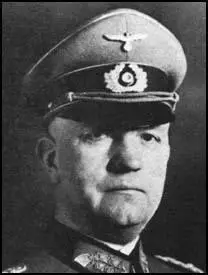Friedrich Fromm

Friedrich Fromm was born in Berlin on 8th October, 1888. He joined the German Army and by the end of the First World War had reached the rank of lieutenant.
Fromm remained in the army and worked under General Ludwig Beck the chief of general staff. In 1937 he was made commander of the Replacement Army and during the Second World War was chief of armaments (1939-44).
An early supporter of Adolf Hitler, Fromm became disillusioned with his management of the war and by 1942 Fromm favoured a negotiated peace with the Soviet Union.
Fromm was suspected of being involved in the July Plot. He attempted to cover his tracks by executing Claus von Stauffenberg, Friedrich Olbricht and Werner von Haeften. He also arranged the suicide of Ludwig Beck. When Joseph Goebbels arrived on the scene he told Fromm: "You've been in a damned hurry to get your witnesses below ground."
Arrested by Heinrich Himmler on 21st July, 1944, he was brought before the People's Court and charged with not reporting the conspiracy. Erich Fromm was found guilty and executed on 12th March, 1945.
Primary Sources
(1) Albert Speer, Inside the Third Reich (1970)
Hitler's decisions led to a multiplicity of parallel projects. They also led to more and more complicated problems of supply. One of his worst failings was that he simply did not understand the necessity for supplying armies with sufficient spare parts. General Guderian, the Inspector General of Tank Ordnance, frequently pointed out to me that if we could repair our tanks quickly, thanks to sufficient spare parts, we could have more available for battle, at a fraction of the cost, than by producing new ones. But Hitler insisted on the priority of new production, which would have had to be reduced by 20 percent if we made provision for such repairs.
General Fromm as Chief of the Reserve Army deeply concerned about this kind of poor planning. I took him with me to see Hitler several times so that he could present the arguments of the military. Fromm knew how to state a problem clearly; he had presence and had diplomatic tact. Sitting there, his sword pressed between his knees, hand on the hilt, he looked charged with energy; and to this day I believe that his great abilities might have prevented many a blunder at the Fuehrer's headquarters. After several conferences, in fact, his influence increased. But immediately opposition appeared, both on the part of Keitel, who saw his position threatened, and on the part of Goebbels, who tried to persuade Hitler that Fromm had a dangerous political record. Finally. Hitler clashed with Fromm over a question of reserve supplies. Curtly; he let me know that I was no longer to bring Fromm with me.
(2) Joseph Goebbels, diary (9th March, 1945)
Colonel-General Fromm has been sentenced to death for cowardice in face of the enemy. He thoroughly deserves this sentence. Admittedly it could not be proved that he was actually involved in 20 July; but he did not take the measures which were his duty in order to prevent 20 July.
(3) When Erich Fromm was accused of treason Albert Speer offered to appear before the people's court as a witness for the defence
I heard, or rather had it hinted to me, that Hitler had ordered the execution of General Fromm. A few weeks before Minister of Justice Thierack had remarked to me, offhandedly and completely unmoved between two courses of a meal: "Fromm's going to lose his bonnet soon tool" My efforts to speak up for Fromm that evening remained fruitless; Thierack was not in the least impressed. Consequently, a few days later I sent him a five page official letter in which I refuted most of the charges against fromm, insofar as I knew what they were and offered to appear before the People's Court as a witness for the defense.
That was probably an unprecedented request on the part of a Reich minister. Only three days later, on March 6,
1945, Thierack wrote me curtly that I would have to obtain permission from Hitler in order to testify. "The Fuehrer has just informed me," Thierack continued, "that he has no intention of issuing an exceptional permission to you in the case of Fromm. I therefore will not include your statement in the records of the court. The executions also made me aware of the nature of the risk I was running.
